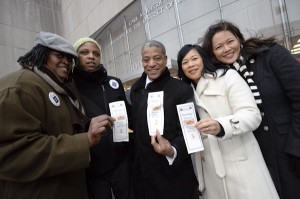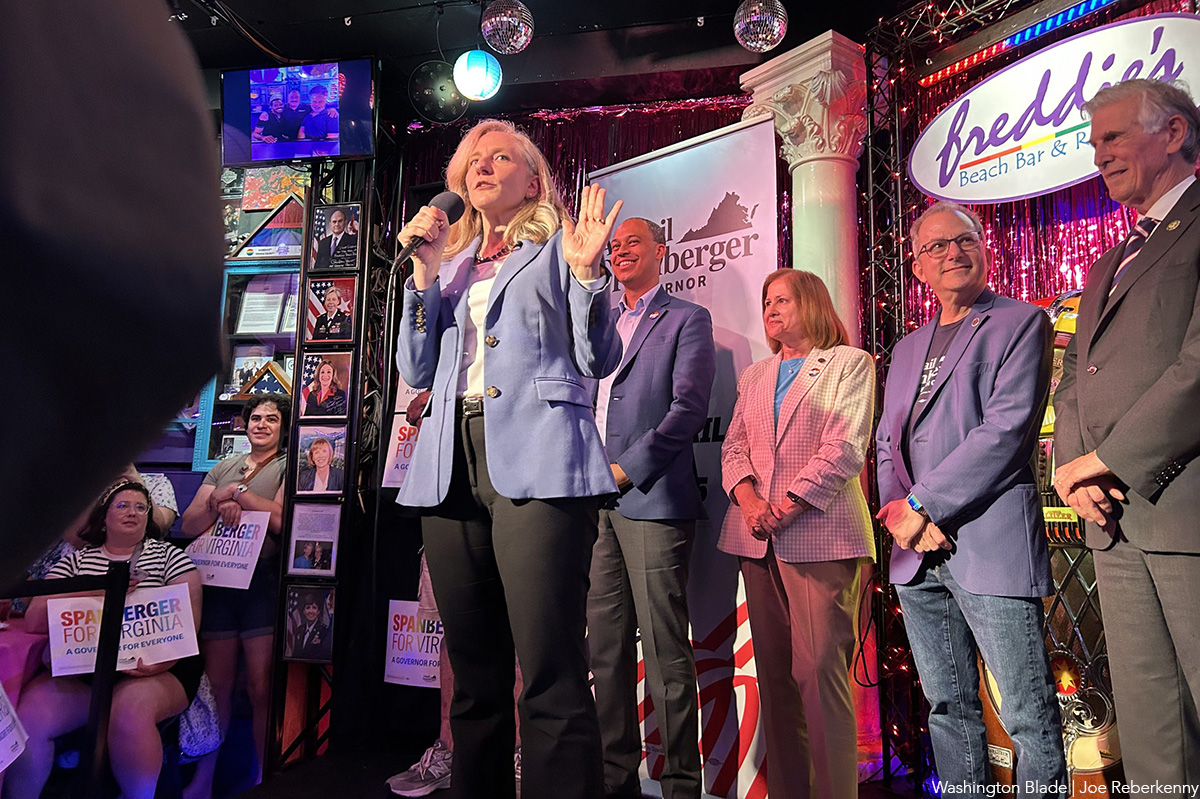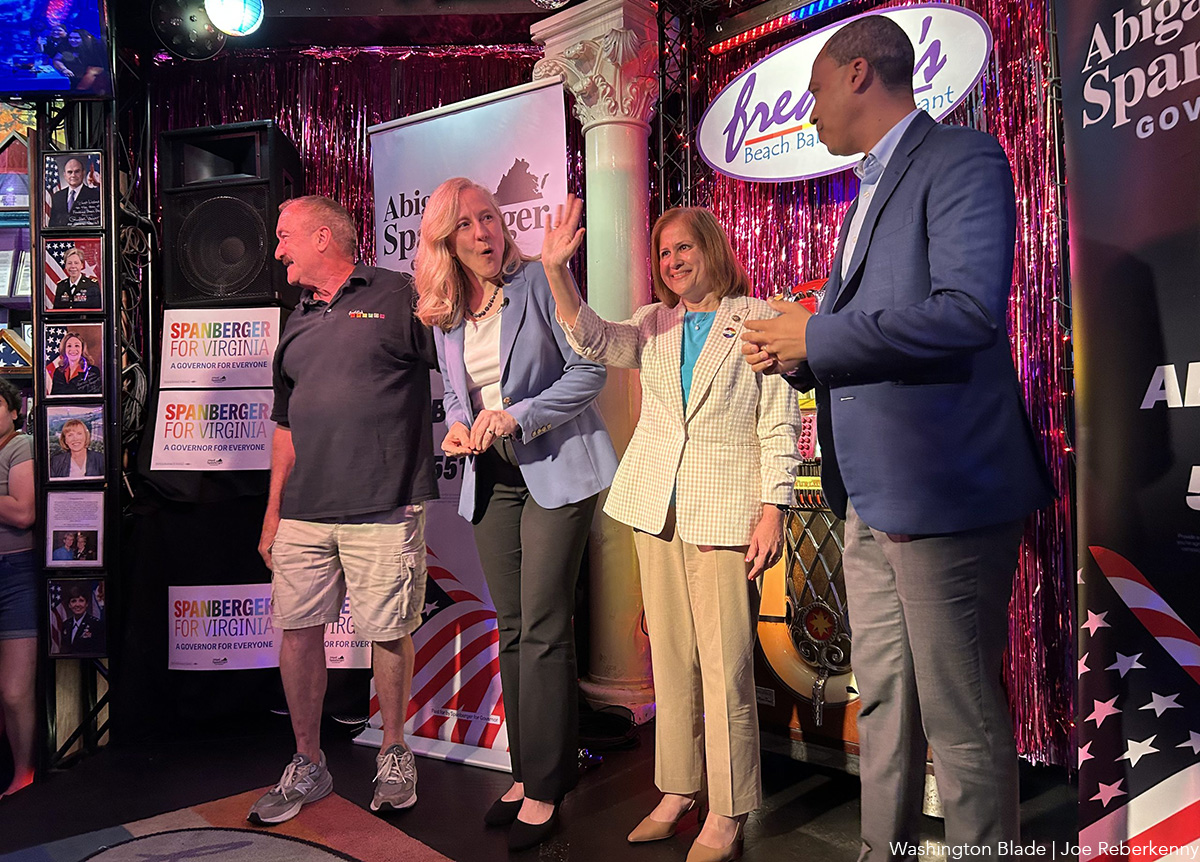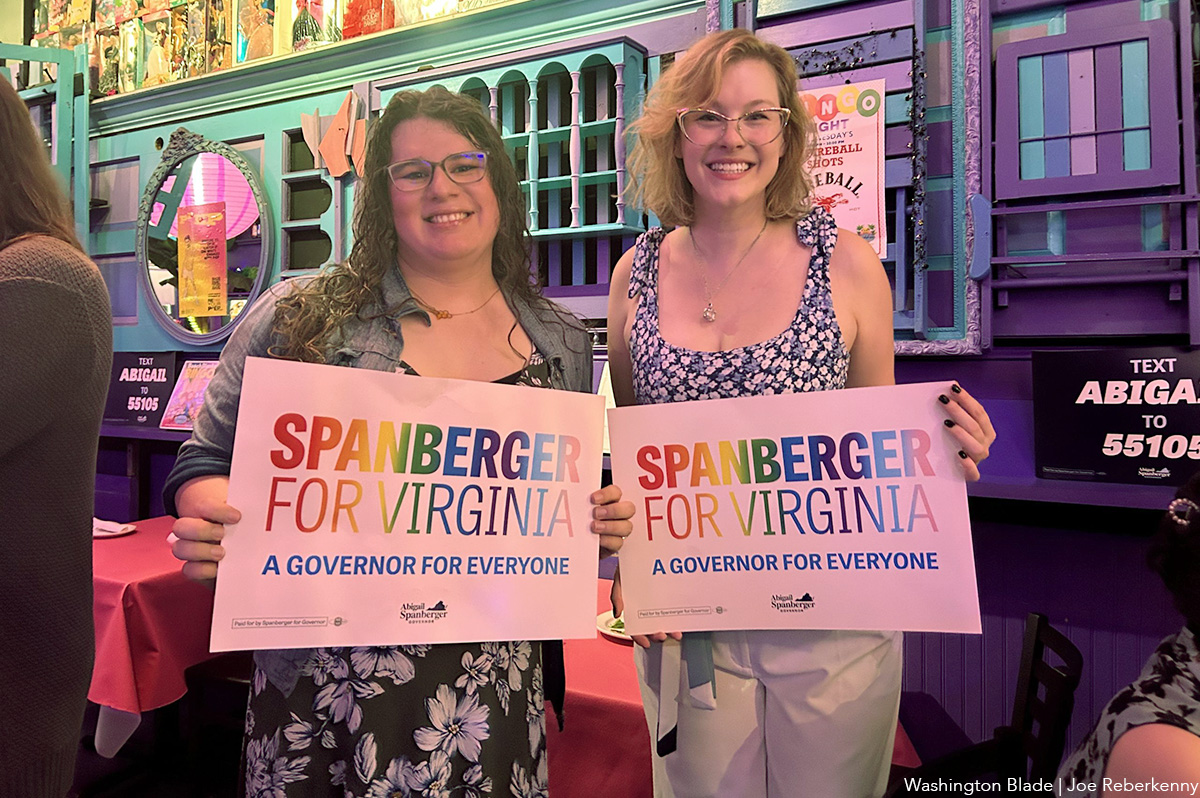Local
D.C. chief judge’s advice for couples planning to wed
Clerks can’t refuse to perform civil weddings on religious grounds

Couples lined up outside D.C. Superior Court on March 3 to obtain same-sex marriage licenses the first day they became available. (Photo by Joe Tresh)
D.C. Superior Court Chief Judge Lee Satterfield, who oversees the court’s Marriage Bureau, offered advice for same-sex couples coming to the courthouse for the first time to apply for a marriage license or a court officiated civil wedding.
In an interview with DC Agenda on the day before the city’s same-sex marriage law took effect March 3, Satterfield acknowledged the occasion would be “exciting” for gay couples and promised to do all he could to make the license application process run smoothly.
He said that while he could not comment on internal court personnel matters, he made it clear that clerks and other court officials could not decline to perform same-sex wedding on religious or moral grounds, as is the case in other jurisdictions where gay marriage is legal.
“We expect to have anyone doing and officiating weddings to be officiating all weddings,” he said.
Following is a transcript of Satterfield’s interview with DC Agenda:
DC AGENDA: Leah Gurowitz, the court’s public information officer, said you might be able to talk about the procedures at the courthouse for accommodating the city’s new same-sex marriage law.
LEE SATTERFIELD: I thought it would be good to give some information to the public. I know it’s going to be an exciting day tomorrow for a lot of folk who have been waiting and a lot of residents here in D.C. and even elsewhere who may come to D.C. to apply for a marriage license. So I wanted to offer some tips or advice as to how to make this a good experience and a smooth one.
AGENDA: Thank you. What would you suggest people do as the process begins?
SATTERFIELD: We’re open every day during the weekday 8:30 to 5 p.m. We’re available on other days other than [Wednesday]. But for folk who want to come [Wednesday] during what we expect to be a huge rush and a significant increase in numbers, we’re asking people to, number one, come with a lot of patience because we normally get about 10 to 12 applications in a day. And while I’m going to add some staff to the Marriage Bureau so that we can process a significant amount more, and we’re going to work very hard to do so, I expect that there will be some time delays. But we will accommodate everybody. So we’re asking, number one, that people be patient, who decide to come [Wednesday] and the next couple of days soon after the law becomes effective.
And then there are a number of other things they can do. For instance, come with a completed application. We loaded the application on our web site — dccourts.gov, you can go into the Superior Court section — or actually, there’s a link on the front page for folk to go right to the Marriage Bureau section and get the application so they complete it. I think it’s important that folk — some of the things we see happen to folk that end up having to come back is that they don’t come down with their identification because the law requires that you have to be 18 years and older.
And so if there’s one party coming down they may come down with their own but not with their partner’s — so they have to make sure they have some identification, whether it’s a driver’s license, passport, birth certificate, not just for themselves but the person they’re marrying. So those are the kinds of things that trip people up and they end up having to come back again.
We want to try to avoid, particularly when we expect a significant increase. And then, of course, bring money — cash or money order with the amount. The fee is $35 for applying and then, of course, $10 for the marriage certificate, and that could be paid that day. We have a separate finance office for that, or any day up until you get your license. You have to have proof of payment before that — unless you are registered under the D.C. domestic partnership act. Then we’ll waive the fee. But please bring your certificate showing proof that you’re registered to show the clerks so that they can waive the fee.
AGENDA: What’s the procedure for a civil wedding at the courthouse? Isn’t there an additional waiting time for courthouse weddings?
SATTERFIELD: I’m being told now from one of my staff persons that knows all this that when they apply for the application they apply for a civil wedding at that time. So it will probably be 10 days from that time.
AGENDA: Ten days from when they apply for the license?
SATTERFIELD: Ten days or more. We use that as a reasonable period. Obviously, if they want to do it after 14 days or a specific date after the tenth day, we try to set it for that.
AGENDA: If someone does apply for a civil marriage, who exactly performs them? The web site says something about officials from the staff.
SATTERFIELD: Right. In terms of the civil marriages that are conducted at the courthouse, I designated as chief judge through the clerk of the court here a number of staff. Usually they’re supervisors or managers. And I’ve added some more — authorized some more individuals to do the civil marriage. The judges typically are not doing them during the day because they are involved in their dockets, the cases they have to hear each day, which are quite extensive. So very rarely are the judges involved. Sometimes the judges will go up to help out if we have an increased demand and so forth. And so if it’s done at the court it’s usually done by one of the duly sworn officiates that we designate to perform these weddings. And then individuals, judges do them outside of court for individuals who request — usually somebody that knows the judge. It’s that kind of connection. But we very rarely have judges go up there because at the time of the day they would go during the lunch hour and it’s hard to get them up there because of their other responsibilities.
AGENDA: But if a judge knows the couple…
SATTERFIELD: Oh, sure. If the couple arranges with a judge to perform their ceremony, they should bring the judge’s name and add it to the application so that it can be placed on the certificate. Or if it happens later, that’s fine, too. You don’t have to have it on the day that you apply. But judges often perform ceremonies — you just kind of get to them in a different way.
AGENDA: Could they do the ceremonies outside the courthouse, too?
SATTERFIELD: Oh, the judges? That’s where they mostly do them. That’s where the judges typically do them because they don’t do them here. Typically they will do them outside on the weekends or in the evenings, those kinds of things.
AGENDA: To the extent that you can comment, in other states officials are allowed to decline to perform a same-sex marriage if it is against their religious beliefs. Can the officials do that here?
SATTERFIELD: You know the law, as I understand it in the District of Columbia, does not allow that when it comes to employees of the court — it does for clergy and others. It allows them to decline. It doesn’t allow for our folk to do so. While I don’t discuss personnel matters, what I will say is this: We expect to have anyone doing and officiating weddings to be officiating all weddings.
AGENDA: Where is the Marriage Bureau in the courthouse?
SATTERFIELD: It’s on the fourth floor. Another point I want to make: We have three entrances to the courthouse. I only say this for a number of reasons. We expect a lot of activity for [Wednesday] — out front, including our main entrance. And we have construction going on out there. So if citizens come up and they see it’s quite crowded out there, we have another entrance in what we call the John Martial Plaza, which is the family court entrance, which is that plaza between the Municipal Building and our courthouse. And then we have an entrance on our C Street side of the court building. In terms of how busy they are, the main one on Indiana Avenue is the busiest. The family court one is the second busiest, and then C Street is the least busy. So we have three avenues of getting in and getting out. So I don’t know what all the activity is going to be like outside. But we have those three avenues of getting in and getting out. And the Marriage Bureau is on the fourth floor.
AGENDA: Leah Gurowitz said there’s an exception to the ban on cameras in the courthouse for weddings there?
SATTERFIELD: Right. Once we schedule your civil marriage, we give a permission slip so that the guards will allow you to bring a camera in. I’m glad you mentioned that because we don’t allow cameras for anyone coming in the courthouse. So if folk were coming in to apply, that would apply to them, but if you’re coming back to have a ceremony or guests of those who are having the ceremony, we will allow cameras in then. And that’s another reason for when we schedule it we make sure that the person gets permission in order to bring the camera past the guards.
AGENDA: In terms of the applications themselves, I noticed they had not changed as of a few weeks ago. They only had space for one bride and one groom.
SATTERFIELD: We modified them. We put the modified or our new standard form up over the weekend. So it’s there now.
AGENDA: Do the new forms use the term “spouse?”
SATTERFIELD: You can go up there and get it. We have taken out the bride and groom part and just put two spouse sections, and we’re going to use that from here on out for all applicants. We’re trying to keep it simple with one form.
AGENDA: Do you think some might object to that? Would more traditional heterosexual couples still want the terms bride and groom?
SATTERFIELD: But it’s just an application. So we’re willing to deal with that on the application part. That’s something that nobody sees but us. The certificate is what everybody wants out of this, because that’s the legal document joining you.
AGENDA: Would that legal document still say bride and groom if the parties want it?
SATTERFIELD: … We never had that on the form. What we do is we list the names of the parties. So we never had that on the certificate of license anyway.
AGENDA: Could you explain what the certificate of license is?
SATTERFIELD: It’s going to have our seal on it. It’s the certificate of marriage, the license number, and it’s going to duly authorize and celebrate the marriage between the named [parties] — both spouses. It will list their names. And then it’s signed by and stamped by the Clerk of the Court. And then whoever officiates it would have to sign it after the marriage is performed and then agree to send a copy back to us for our records. We keep a copy of it at the court. And they get a very nice copy of the certificate and the officiate is able to keep a copy as well.
AGENDA: Is that the one that goes to a church if the wedding will be held there?
SATTERFIELD: That’s right. This certificate goes to whether it is a civil marriage here in our court or signed by a judge or signed by a clergy. It’s one certificate for all.
Maryland
Silver Spring holds annual Pride In The Plaza
‘Today means inclusion. It means to build resilience’

Silver Spring’s annual Pride in the Plaza event took place on Sunday to celebrate the LGBTQ community and emphasize inclusion and resilience.
“Today means inclusion. It means to build resilience, love,” Robyn Woods, program and outreach director for Live In Your Truth, which organized the event, said. “I mean, just being surrounded by the community and so many great entrepreneurs, business owners, and just being a part of this whole rainbow coalition that we call the LGBTQIA to be about.”
With the event being her first time organizing for Live In Your Truth, Woods said she felt emotional to see the support and love at the event.
“Some people (are) bringing out their children, their babies, their grandparents,” Woods said. “It’s a lot more allies here than anything else. That type of support to me means so much more than just support from my community; just outside support, inside support, so much support around it, so much love. Everyone’s smiling outside, helping each other.”
Attendees of the event were able to head over to the Family Fun Zone, an air-conditioned Pride Cool Down Lounge, or watch live drag performances in the main stage area.
Along with entertainment and a shaved-ice stand, rows of information tables stood along the plaza, including FreeState Justice, the Washington Spirit, Trans Maryland, Moco Pride Center, and the Heartwood Program, an organization that offers support, therapy, education, and resources to the LGBTQ community.
“I want people to know about our services, and I love what we have to offer,” Jessica Simon, psychotherapist for Heartwood Program’s Gender Wellness Clinic, said. “I (also) want to be part of a celebration with the community, and so it feels good to be here with other people who have something they want to give to the community.”
She added that within today’s political climate, to which she called an “antidote to shame,” it’s important to be celebrating Pride.
“There’s a lot of demonization of LGBTQI people,” Siena Iacuvazzi, facilitator for Maryland Trans Unity, said. “(Pride) is part of the healing process.”
Iacuvazzi said she was taught to be ashamed of who she was growing up, but being a part of a community helped her flourish in the future.
“I was taught how to hate myself. I was taught that I was an abomination to God,” she said. “But being a community is like understanding that there are people who have experienced the same thing, and they’re flourishing. They’re flourishing because they’re willing to stand up for themselves as human beings and discover themselves and understand what’s true for themselves.”
She added that Pride allows for a mutual understanding to take place.
“It’s more of a sense of belonging … and just taking that home and understanding you’re not alone,” Iacuvazzi said. “We’re each taking our own journey — we’re not putting that on each other. It’s just walking away with a sense of belonging and humanity.”
Similar to Iacuvazzi, Woods said she hopes attendees’ biggest takeaways would be family, fun, resilience, and pride.
“Being proud of yourself, being happy for who you are, and representation and how much it matters,” she continued. “And I think all these young people that are walking around here get to see versions of themselves, but older. They get to see so many different lesbian, gay, bisexual, pansexual people that are successful, that are showing love, that care, and it’s not how we’re portrayed in the media. It’s lovely to see it out here. (It’s) like we’re one big old, happy family.”
Virginia
Spanberger touts equality, reproductive rights in Arlington
Democratic Va. gubernatorial nominee made campaign stop at Freddie’s Beach Bar

With the general election heating up and LGBTQ rights under increasing threat nationwide, Virginia gubernatorial candidate Abigail Spanberger brought her “Span Virginia Bus Tour” to Arlington’s Freddie’s Beach Bar for a campaign stop filled with cheers, policy pledges, and community spirit.
Spanberger, who served three terms in the U.S. House of Representatives from 2019 through early 2025 for Virginia’s 7th Congressional District, also served as a federal law enforcement officer specializing in narcotics and money laundering cases, and as a CIA case officer working on counterterrorism and nuclear counterproliferation.
Spanberger is running against Republican nominee Winsome Earle-Sears, the current lieutenant governor of Virginia, who said she was “morally opposed” to a bill protecting marriage equality in the commonwealth.
She was joined by other Democratic candidates and supporters: lieutenant gubernatorial candidate Ghazala Hashmi, attorney general candidate Jay Jones, Virginia state Sen. Adam Ebbin (D-Alexandria), and Congressman Don Beyer.

Freddie’s was packed wall-to-wall with supporters, many of whom wore “Spanberger for Virginia” shirts in the progressive Pride flag colors. In her speech, she made it clear that LGBTQ Virginians’ rights are on the ballot this year.
“I’m so excited to be here, and I am so grateful to the entire staff of Freddy’s for letting us overtake this incredible venue that is not just an awesome place to come together in community, but is a symbol to so many people of joy, of happiness, of community and of celebrating our friends and our neighbors,” Spanberger told the packed restaurant. “It is exciting to be here, and particularly during this Pride month, and particularly as we reflect on the 10-year anniversary of Obergefell and the reality that we still have so much work to do.”
“The reality is there are so many people who still would be inclined to take us backwards,” she said. “In this moment when we see attacks on people’s rights, on people’s humanity, on Virginia, on our economy, on research, on public education, on food security, on health care, on Virginians, on their jobs, on public service and on people — it can get heavy.”
“What it does for me is it makes me want to double down, because once upon a time, when I was talking to my mother about some horror show or sequence of activities coming out of a particular administration, she did not really have the patience to listen to me and said ‘Abigail, let your rage fuel you’ — and the conversation was over. And so I reflect on that, because, in fact, every day there is so much fuel to be had in this world and in this moment.”
One of the points Spanberger continued to emphasize was the importance of steadfast state government officials following the election of President Donald Trump, which has led to rollbacks of LGBTQ and bodily autonomy rights as a result of the conservative-majority U.S. Supreme Court.
“What the past few years have shown us is that a Supreme Court decision, no matter how many years we have celebrated its existence, does not protect us in the long term. And so as governor, I will work to make sure that every protection we can put in place for the dignity, the value, and the equal rights of all Virginians is a priority.”
During her speech, Spanberger highlighted several of the key values driving her campaign — protecting reproductive freedom and human rights, lowering healthcare costs, safeguarding Virginia’s environment, and ensuring that public education is affordable, accessible, and rooted in truth, not politics.
Spanberger went as far as to say that she wants to amend the state’s constitution to remove Section 15-A. “The reality is that in Virginia, we still have a ban in our state constitution on marriage equality. It is of the utmost urgency that we move forward with our constitutional amendment.”
“We will work to ensure that that terrible constitutional amendment, that was put in years ago, is taken out and updated and ensuring that Virginia is reflective in our most essential documents of who we are as a commonwealth, which is an accepting place that celebrates the vibrancy of every single person and recognizes that all Virginians have a place, both in that constitution and in law,” she added.
Following the event, two supporters spoke to the Washington Blade about why they had come out to support Spanberger.
“I came out because I needed to show support for this ticket, because it has been a particularly rough week, but a long few years for our rights in this country, in this state, with this governor, and it’s — we need to flip it around, because queer people need protection,” said Samantha Perez, who lives in Ballston. “Trans people need protection. Trans kids need protection. And it’s not gonna happen with who’s in Richmond right now, and we just need to get it turned around.”

“The whole neighborhood’s here. All our friends are here,” said Annie Styles of Pentagon City. “It means the world to me to take care of each other. That’s what a good community does. That’s not what we’ve had with the Republicans here or across the nation for a really long time. It’s time to show that care. It’s time to make sure that good people are in a position to do good things.”
District of Columbia
Activists protest outside Hungarian Embassy in DC
Budapest Pride scheduled to take place Saturday, despite ban

More than two dozen activists gathered in front of the Hungarian Embassy in D.C. on Friday to protest the country’s ban on Budapest Pride and other LGBTQ-specific events.
Amnesty International USA Executive Director Paul O’Brien read a letter that Dávid Vig, executive director of Amnesty International Hungary, wrote.
“For 30 years Budapest Pride has been a celebration of hope, courage, and love,” said Vig in the letter that O’Brien read. “Each march through the streets of Budapest has been a powerful testament to the resilience of those who dare to demand equality, but a new law threatens to erase Pride and silence everyone who demands equal rights for LGBTI people.”
“The Hungarian government’s relentless campaign against LGBTI rights represents a worrying trend that can spread normalizing division and hatred,” added Vig. “Thank you for standing with us when we refuse to be intimidated.”
Council for Global Equality Chair Mark Bromley and two of his colleagues — Stephen Leonelli and Keifer Buckingham — also spoke. Health GAP Executive Director Asia Russell and Chloe Schwenke, a political appointee in the Obama-Biden administration who worked for the U.S. Agency for International Development, and Planned Parenthood staffers are among those who attended the protest.
(Washington Blade video by Michael K. Lavers)
Hungarian lawmakers in March passed a bill that bans Pride events and allow authorities to use facial recognition technology to identify those who participate in them. MPs in April amended the Hungarian constitution to ban public LGBTQ events.
Budapest Pride is scheduled to take place on Saturday, despite the ban. Hundreds of European lawmakers are expected to participate.
“Sending strength to the patriotic Hungarians marching tomorrow to advance human dignity and fundamental rights in a country they love,” said David Pressman, the gay former U.S. Ambassador to Hungary, on Friday on social media.
Sending strength to the patriotic Hungarians marching tomorrow to advance human dignity and fundamental rights in a country they love. Szabadság és szerelem. My past remarks on Budapest Pride: https://t.co/y1QhA9QouA
— David Pressman (@AmbPressman) June 27, 2025
-

 U.S. Supreme Court3 days ago
U.S. Supreme Court3 days agoSupreme Court upholds ACA rule that makes PrEP, other preventative care free
-

 U.S. Supreme Court3 days ago
U.S. Supreme Court3 days agoSupreme Court rules parents must have option to opt children out of LGBTQ-specific lessons
-

 India5 days ago
India5 days agoIndian court rules a transgender woman is a woman
-

 National4 days ago
National4 days agoEvan Wolfson on the 10-year legacy of marriage equality










